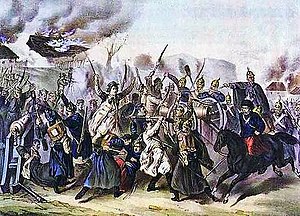User:Mateuszmajewski
Marek Cichocki | |
|---|---|
| Born | 9 May 1966 |
| Occupation(s) | journalist, columnist, historian of political thought |
| Spouse | Lena Dąbkowska-Cichocka |
Marek Cichocki[edit]
Marek Aleksander Cichocki (born 1966 in Warsaw) is a Polish philosopher, historian of political thought, journalist, conservative columnist and former advisor to Lech Kaczyński, the late President of Poland.
Biography[edit]
Cichocki graduated in German Studies, and in 1998 he received his PhD degree in Philosophy at the Institute of Philosophy and Sociology of the Polish Academy of Sciences.
Between 1996 and 2000 he was an Assistant Professor in the Institute of Applied Social Sciences at the University of Warsaw, where he has worked since 2001 as Adjunct Professor. Between 2000 and 2002 he lectured in Political Science at the Melchior Wankowicz Warsaw College of Journalism. He is also a Fellow of the Collegium Invisible.
Cichocki's scholarly interests include history of political thought (particularly conservative thought and its contemporary perceptions) and current social and political issues including international relations, especially Polish-German relations.
He was Program Director of the Center for International Relations in Warsaw. Since 2004 he has been Program Director at the Natolin European Center and Editor-in-Chief of its well-known periodical. Since 2003 he has been publisher and editor-in-chief of the yearbook Political Theology. He collaborates with the Center for Political Thought in Cracow. He has published a number of books, essays and articles on philosophy, political science, and international relations, including Polska-Unia Europejska, W pół drogi (2002), Porwanie Europy (2004), or Władza i pamięć (2006).
Between 2007 and 2010 he co-hosted with Dariusz Gawin and Dariusz Karlowicz Trzeci Punkt Widzenia (A Third Point of View), a TV programme broadcast by the Polish state television network TVP.
From 11th January 2007 Cichocki served as a citizen advisor to Lech Kaczyński. He was a major Polish negotiator during the European Union summit in Brussels in June 2007.
Married to Lena Dabkowska-Cichocka.
__________________________________________________________________________
Polish Thermopylae[edit]

The Polish Thermopylae is a name used to refer to several battles in Polish history. The Polish Thermopylae is a reference to the battle of Thermopylae, where a Spartan force showed great courage despite being greatly outnumbered by the enemy.
Famous last stands dubbed "the Polish Thermopylae":[edit]
- Battle of Hodow (1694) – a battle between the Polish and Tartar armies. The hussars contributed to the victory of the Polish army despite being vastly outnumbered (around 40 000 Tartars against 400 Poles).
- Battle of Węgrów (3 February 1863) – this battle was part of the January Uprising (Polish: powstanie styczniowe) and it inspired Auguste Barbier, a French poet, to write a poem entitled “Atak pod Węgrowem” (The Charge at Węgrów), in which he compared the attack of the Polish scythemen troops on Russian cannon to the heroic deeds of the ancient Spartiates. The comparison soon became popular in Europe, leading to a wave of popular support for the Polish cause. Barbier was not the only poet to compare the Poles to Spartans; similar references are contained in poems such as “Vanitas” (by Cyprian Kamil Norwid) or “Bój pod Węgrowem” (Maria Konopnicka).
- The battle of Zadwórze (17 August 1920) – part of the Polish-Soviet War, during which a Polish army battalion consisting of the Lwów Eaglets (Polish: Orlęta Lwowskie) barred the way to Lwów preventing an advance of the 1st Cavalry Army commanded by Semyon Budyonny. 318 of the 330 soldiers were killed, and some were taken prisoner. Captain Bolesław Zajączkowski, the batallion's commander, committed suicide together with several of his soldiers, and was later nicknamed the ‘Polish Leonidas’. The bodies of five identified officers were buried at the Cemetery of the Defenders of Lwów. The remaining ones were buried in a kurgan on the battlefield. The kurgan bears a memorial plaque which reads: “To the Lwów Eaglets, who fell protecting the entire borderland on 17 August of 1920.”
- Battle of Dytiatyn (16 September 1920) – a battle fought during the Polish-Soviet War.
- Battle of Wizna (7-10 September 1939) – a battle fought during the September Campaign (Polish: Kampania Wrześniowa). These were 720 Polish soldiers under the command of Wladyslaw Ragins who took a famous last stand against 42,200 German soldiers with 350 tanks, 457 mortars, cannon, grenade launchers and 600 Luftwaffe aircraft; the ratio roughly works out to one Polish soldier per sixty Germans and one aircraft. Only a few Polish soldiers were taken into captivity, the rest were killed fighting to the end; the commanding officer kept his oath to die rather than surrender. When his soldiers ran out of ammunition, Raginis ordered his remaining men to surrender while he remained at the command post andf committed suicide by detonating a hand grenade.
Last updated: 2013-02-13
